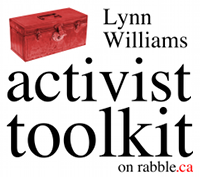Gah! More Olympics? You can change the conversation. Chip in to rabble's donation drive today!
With the Olympics officially underway, it’s time to raise the activist game. The 2014 Winter Games in Sochi have already drawn a lot of criticism. Of course, Russia’s firm anti-LGBTQ stance has garnered the most attention, particularly with Putin engaging in very public tirades against gay athletes, activists and other "nontraditional" individuals almost daily. You know it’s big when Google gets in on the act (have you seen the new homepage?).
But let’s not forget the multitude of other violations that Russia, its leaders, and the Olympic organizing in Sochi have been batting right out of the park. From the slaughter of stray dogs, to the clampdown of protesters in the Ukraine, the Olympic Games at this point should be a side show to more important news.
In honour of some of the great organizing we saw at the Vancouver Olympics, here are a few lessons to pass on to activists in Sochi:
1. Make your protests fun and interesting.
Emphasizing creative protests are a great way to draw attention to your cause, and quickly appeal to passers-by who might not otherwise understand your movement. Check out this tool to help you design a unique protest, or take a look at this guide about protesting using drama. Performing a short skit on the streets of Sochi would gain major respect in my book.
Vancouver saw an incredible number of creative exhibitions - projects that put a colourful spin on a traditional strategy. For instance, telling a story through art may not be a new concept, but it’s a great way to draw a large crowd when you’re looking to raise awareness in a body-saturated area. Check out this account of a compelling art installation on the side of a downtown-Vancouver building.
2. Force skeletons out of the closet
I’m sure we all remember the efforts in Vancouver to brush some of the city’s "rough edges" under the rug. Last-minute efforts to hide the true nature of the city, like the relocation of homeless folks in the Downtown Eastside of Vancouver, are currently underway in Sochi as well.
Luckily, Vancouver activists didn’t take these offensive “band-aid” solutions lying down. While international attention flooded the city, advocacy organizations were asking pointed questions about affordable housing and gentrification.
Activists in Sochi need to do the same in order to dump the Russian skeletons out of the closet. Particularly in the face of political issues, this means asking leaders the tough questions, and publishing the harsh column or blog post. If you need a low-impact way to contribute, you can sign this petition to end the slaughter of stray dogs in Sochi, and advocate for animal shelters to be created. Look at that – protesting at the Olympics, from halfway across the world.
3. Speak truth to powers that be
Activists are used to standing up to leaders and politicians. But when an international event like the Olympics rolls around, it’s even more important to tell the powerful what's really going on. Politicians at home and abroad, Olympic organizers and their Canadian allies, even anti-gay organizations here at home are a great place to focus a letter writing campaign, petition or demonstrations.
There’s another powerful voice in this race that makes a great rallying point – corporate sponsors. Olympic sponsors like Coco-Cola and McDonald’s invest millions of dollars into the Games every year. Particularly for activists at home, pinpointing domestic headquarters is a great way to organize effectively without heading into the heart of Sochi.
It’s important to ask the hard questions, to push Russian leaders on the topic of violence in the Ukraine, to bring animal rights activists on scene in Sochi, and to demand accountability from corporate sponsors.
When Vancouver’s Downtown Eastside came under intense media splotlight, advocacy groups jumped into action. Sex workers were receiving interview requests left, right, and centre, and several media training workshops were created to help manage the massive amount of attention. This type of grassroots organizing is especially helpful because it protects vulnerable groups, strengthens activist communities, and unifies individuals against a common goal.
4. Question the structure
There’s no doubt about it – the Olympics are expensive. The Sochi Olympics have been pegged around $51 billion (and those are conservative estimates). But with that kind of price tag, there are also a whole host of surrounding corruption issues. Check out this informative guide to key players and corruption in Sochi, created by the Anti-Corruption Foundation.
Of course, all of this economic analysis doesn't consider the abuse of workers, major delays and health violations (where hotel guests were warned not to use the water) and even a mounting death toll as preparations went into overdrive in the past few weeks.
All of these preparations take a huge toll on the environment, too. The Vancouver Olympics came with a cost of higher CO2 emissions, damage to valuable natural forestation, and a whole host of other consequences for agriculture and ecosystems near to Olympic sites. To honour this environmental impact, consider engaging in some kind of “sustainable” graffiti to make your views known. Check out this tool on green street art for cool examples. Some of the activities may not work for the winter, but projects like four-based paint tend to hold up quite well in cold climates like Russia or Canada. You only have to worry if fresh snow will cover your message!
After all, with huge price tags, extreme environmental damage, widely oppressed human rights and a climbing death toll – sometimes you have to wonder whether an international sporting competition is worth those kind of results.
What will you be doing to fight against the Olympics this time around?





Comments
Do
Don't